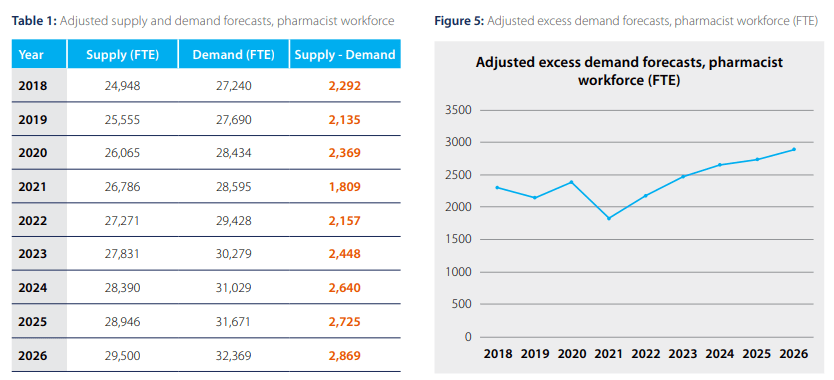Australia has long been the dream destination for pharmacists from across the world. And for good reasons. From a world-class healthcare system to an internationally recognised standard of pharmacy education, the country offers a lot. Not only does it provide pharmacists with an opportunity for a fulfilling career, but the high salaries and the lifestyle are a major attraction.
One key factor in this path is the OPRA exam. It is essential in determining a pharmacist's eligibility to practice in Australia.
Recently, there have been talks of the high saturation of pharmacists in Australia. This has cast a doubt on a lot of pharmacy graduates about the viability of the OPRA exam and a career in Australia.
In this blog, we will see the current situation of pharmacist saturation in Australia and explore whether taking the OPRA exam is still worthwhile.
Current State of the Pharmacy Job Market In Australia
Before we dive into all the details of the job market saturation and oversupply of pharmacists, we need to understand what saturation means.
What is Job Market Saturation?
Saturation essentially means that there is more supply than demand. In this context, it means there are more qualified pharmacists than the number of job openings.
But is this a fact, or just a fad that is spreading without proof?
According to the latest data published by the Australian Bureau of Statistics, the job market has shown a staggering growth. .
As of May 2025, there are more than 55,000 vacancies in the healthcare sector, which includes the pharmacy sector.
Pharmacist Distribution in Australia
As per data published by the Australian government, the share of pharmacists in territories like Northern Australia and Tasmania is pretty low, with 0.7% and 1.7% share, respectively.
While some states like Victoria and New South Wales have a pharmacist population of 33.3% and 30.2%, the others have much lower numbers.
These numbers play a major part in the perception of high saturation of the pharmacy job market in Australia.
Pharmacist density per capita in Australia
While the above distribution gives an idea of the pharmacist population, it is important to know the per capita density. This varies over different territories in Australia, showing an imbalance in the urban and regional workforce.
| S.No | Area | Pharmacists/100,000 people |
| 1 | Nationally | 129.6 |
| 2 | Australian Capital Territory | 154 |
| 3 | Tasmania | 150.4 |
| 4 | Western Australia | 132.8 |
| 5 | Victoria | 132.7 |
| 6 | South Australia | 132.4 |
| 7 | Queensland | 127.2 |
| 8 | New South Wales | 122.1 |
| 9 | Northern Territory | 109.5 |
Let us understand the reasons for the growing supply of pharmacists in Australia.
Regional Pharmacists Shortage and Urban Saturation in Australia
There is also a difference between the regional pharmacist shortage and the urban pharmacist shortage.
As per APHRA, nearly 80% of the registered pharmacists work in urban areas and big cities.
13% work in inner regional areas, while only 4.7% work in the outer regional and more remote areas.
This imbalance has created both saturation as well as shortage in different areas of the country.
Understanding Pharmacist Saturation
The Australian pharmacy job market has experienced a surge in pharmacy graduates in recent years. This has led to increased competition for available positions.
Several factors have contributed to this increase:
- Expansion of pharmacy schools
- An influx of international pharmacy graduates
- Changes in healthcare policies affecting the demand for pharmacists
Nevertheless, the opportunities are aplenty.
Although the Australian government prioritizes Australian citizens for pharmacist jobs, the shortage has prompted a series of changes.
The government has implemented several policies to benefit the immigration of skilled professionals like pharmacists in Australia to deal with the growing demand.
As per the 8th Community Pharmacy Agreement, the government of Australia has pledged to work towards increasing the accessibility of the Australian population to safe, affordable, life-saving medicines. This will be provided through community pharmacies, which in turn will create more pharmacy jobs.
With policies like the skilled visa program, fast PR applications, and the adoption of the 8th CPA, the time to start a pharmacy career in Australia is now, despite the apparent market saturation.
Impact of Pharmacy Saturation on International Pharmacy Graduates
The saturation of pharmacists in some major cities in Australia does not have a significant negative impact on overseas pharmacists who want to work in Australia.
In fact, the introduction of the new policies and reports on pharmacist shortage speaks otherwise.
According to the Workforce Capability Project by The Pharmacy Guild of Australia, there is a high demand for pharmacists in Australia. The table and graph below capture the numbers.

It is important to understand that the oversupply of pharmacists in Australia is mostly limited to major cities. It is not a true representation of the entire country.
Therefore, it's important for international pharmacy graduates to keep in mind to:
- Recognise that pharmacists are still highly sought after in Australia
- Opportunities for pharmacist jobs are abundant
- Visas are readily available for pharmacists who have passed the OPRA exam
- Many individuals are making the move to relocate to Australia for their careers
How to Enter the Australian Pharmacy Workforce?
Overseas pharmacists who want to begin their career in Australia need to pass the OPRA Exam.
This assessment tests your eligibility and competency to practice in Australia. It is one of the ways through which the Australian Pharmacy Council maintains the standard of pharmacy in Australia.
Some of the OPRA exam particulars are:
- Duration of Exam: 2.5 Hrs
- Number of Questions: 120
- Mode of Exam: CAT MCQ (Online)
- Exam Fee: $2190 AUD (INR 120,450)
- Test Center: Worldwide
Also Read: OPRA Exam for Overseas Pharmacists: Pattern, Structure and Testing Method Explained
The exam results are released 4 weeks after the exam.
- Hence, the first step in entering the Australian pharmacy workforce is to clear the OPRA exam.
- Once you clear the OPRA Exam and have your English language proficiency test score, you can apply for a provisional registration with the Pharmacy Board of Australia.
- Apply for internship positions with the provisional registration license. The internship period is 6 months.
- After completing 75% of the internship period, apply for the Intern Written Exam.
- Lastly, clear the oral assessment after completing the internship.
- With a Skills Assessment Certificate, apply for full registration and start the visa process.
With your registration and visa in hand, you can start your search for pharmacy jobs in Australia.
In spite of the apparent oversupply of pharmacists in Australia, there are plenty of job opportunities to be found.
With a shortage of pharmacists in regional and rural areas, it is advised to aim for jobs in such places.
With government incentives and high salaries, this is a very attractive package for fresh pharmacy graduates.
In Summary
The pharmacist job market in Australia is blooming. There are plenty of opportunities for international pharmacy graduates. Concerns about market oversaturation are unwarranted. Several government reports show that there is a strong demand for pharmacists across the country.
International pharmacy graduates should confidently explore career opportunities in Australia. Your skills and expertise are valued in the country's flourishing healthcare sector.
The OPRA exam remains a vital requirement for practising pharmacy in Australia.
Academically has an excellent track record of OPRA applicants passing the exam on its first attempt. If you believe in your abilities, we are here to support you every step of the way. Our specially designed OPRA Preparation Course is tailored to help you succeed in your first attempt.
Join hands with the best in the business in your journey to start a successful pharmacy career in Australia.





